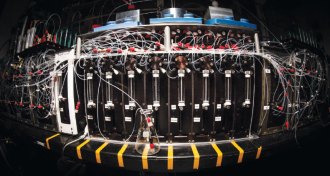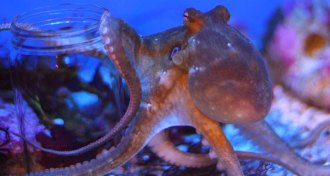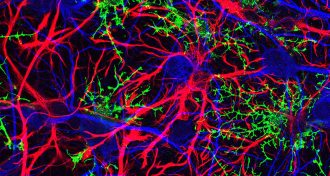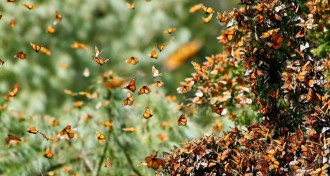Uncategorized
-
 Astronomy
AstronomyLucy’s new neighbor, downloading New Horizon’s data and more reader feedback
Readers discuss why Pluto's data will take so long to get to Earth, the role the cerebellum plays in creative thinking and more.
-
 Chemistry
ChemistryAutomated chemistry could build better drugs fast and cheap
Automated molecular synthesis may win over chemists who are not convinced that more technology in drug design is better.
By Beth Mole -
 Health & Medicine
Health & MedicineFootball games come with more head hits than practices do
As football intensifies from practice to games, the number of impacts increases, a new study finds.
-
 Genetics
GeneticsHow an octopus’s cleverness may have evolved
Scientists have sequenced the octopus genome, revealing molecular similarities to mammals.
-
 Particle Physics
Particle PhysicsAntimatter doesn’t differ from charge-mass expectations
An experiment with unprecedented precision finds that protons and antiprotons have the same ratio of charge to mass, which is consistent with theories but disappoints many physicists.
By Andrew Grant -
 Science & Society
Science & SocietyMonster fish, forensics and space exploration on display
Exhibits and opera infuse science into their experience.
-
 Planetary Science
Planetary ScienceNew exoplanet: Big Earth or small Neptune?
NASA’s Kepler spacecraft has discovered a “cousin” of Earth 1,400 light-years away. But even though the new planet bears many similarities to Earth, experts say much about it remains a mystery.
By Andrew Grant -
 Neuroscience
NeuroscienceHints of how the brain “sees” dreams emerge
Nerve cells that make sense of visual input keep chugging away during REM sleep, suggesting that these cells may help a sleeper “see” dreams.
-
 Health & Medicine
Health & MedicineFish oil may counter schizophrenia
Three months of omega-3 fatty acids protects against psychosis for years, a small study suggests.
-
 Neuroscience
NeuroscienceRethinking which cells are the conductors of learning and memory
Brain cells called glia may be center stage when it comes to learning and memory, recent research suggests.
-
 Animals
AnimalsBiologists aflutter over just where monarchs are declining
Citizen science data fuel debate over whether weed control ruined monarch habitat and whether the butterflies are failing to reach their Mexican winter refuge.
By Susan Milius -
 Chemistry
ChemistryMussels use chemical primer to cement themselves to rocks
Gluing proteins contain their own built-in primer.
By Beth Mole